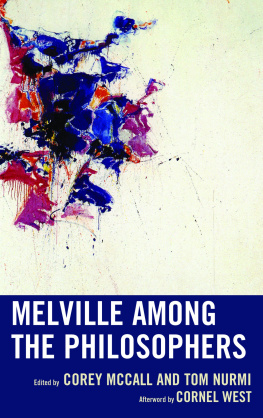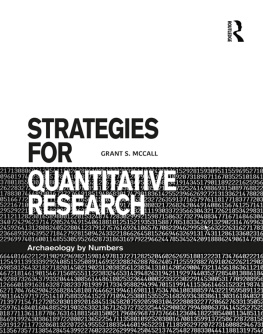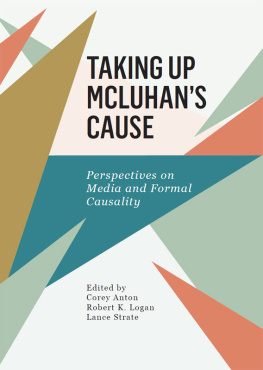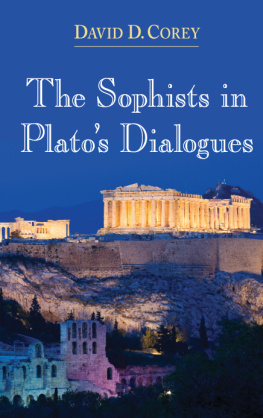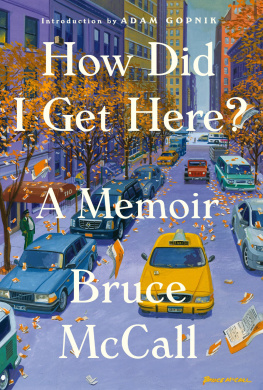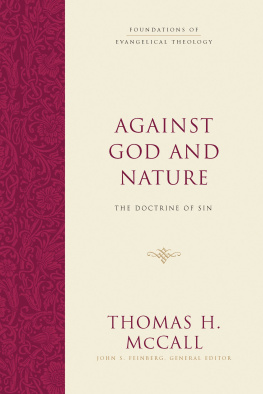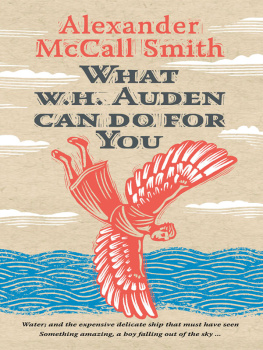Corey McCall - Melville among the Philosophers
Here you can read online Corey McCall - Melville among the Philosophers full text of the book (entire story) in english for free. Download pdf and epub, get meaning, cover and reviews about this ebook. year: 2012, publisher: Lexington Books, genre: Religion. Description of the work, (preface) as well as reviews are available. Best literature library LitArk.com created for fans of good reading and offers a wide selection of genres:
Romance novel
Science fiction
Adventure
Detective
Science
History
Home and family
Prose
Art
Politics
Computer
Non-fiction
Religion
Business
Children
Humor
Choose a favorite category and find really read worthwhile books. Enjoy immersion in the world of imagination, feel the emotions of the characters or learn something new for yourself, make an fascinating discovery.
- Book:Melville among the Philosophers
- Author:
- Publisher:Lexington Books
- Genre:
- Year:2012
- Rating:5 / 5
- Favourites:Add to favourites
- Your mark:
- 100
- 1
- 2
- 3
- 4
- 5
Melville among the Philosophers: summary, description and annotation
We offer to read an annotation, description, summary or preface (depends on what the author of the book "Melville among the Philosophers" wrote himself). If you haven't found the necessary information about the book — write in the comments, we will try to find it.
Melville among the Philosophers — read online for free the complete book (whole text) full work
Below is the text of the book, divided by pages. System saving the place of the last page read, allows you to conveniently read the book "Melville among the Philosophers" online for free, without having to search again every time where you left off. Put a bookmark, and you can go to the page where you finished reading at any time.
Font size:
Interval:
Bookmark:
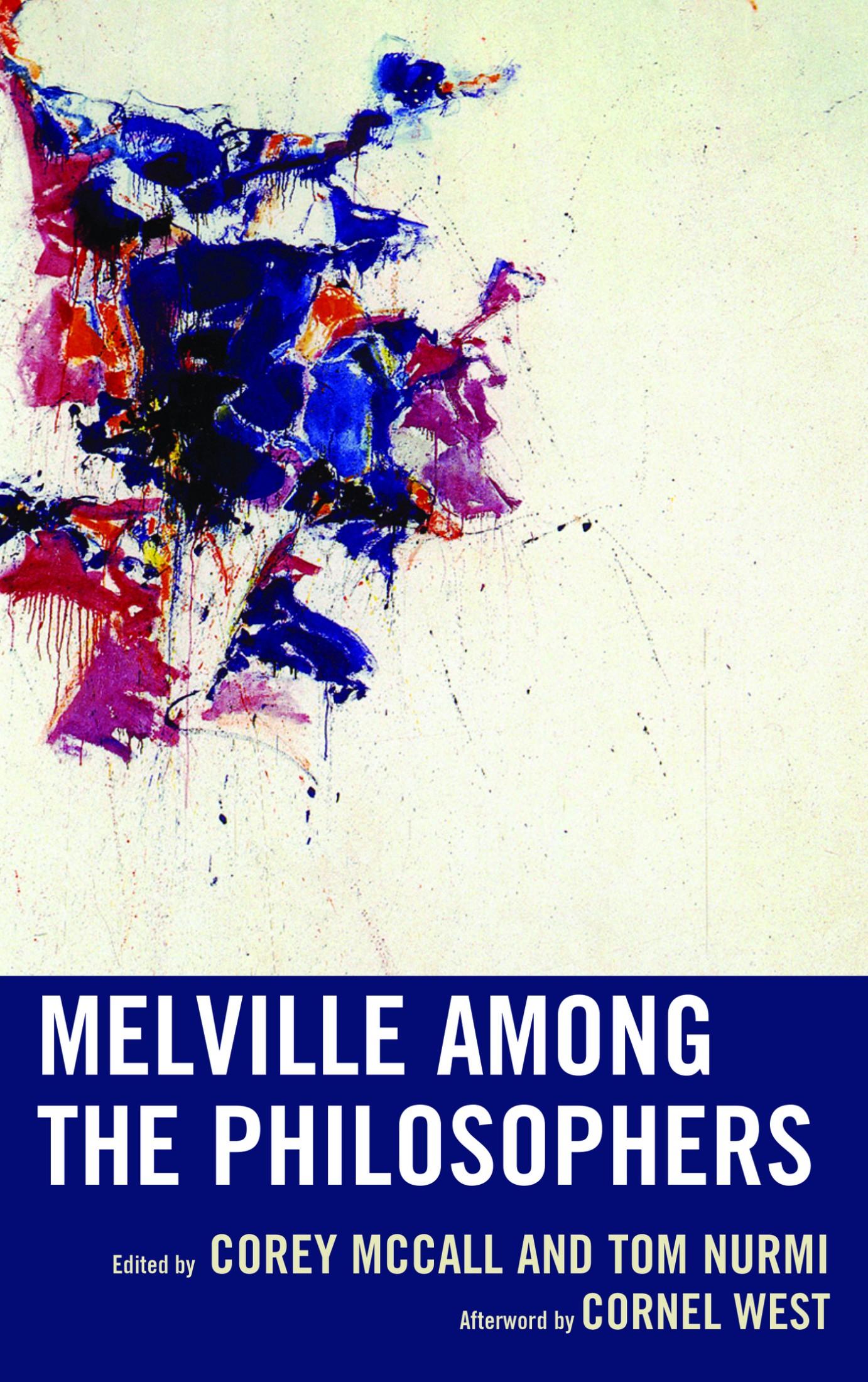
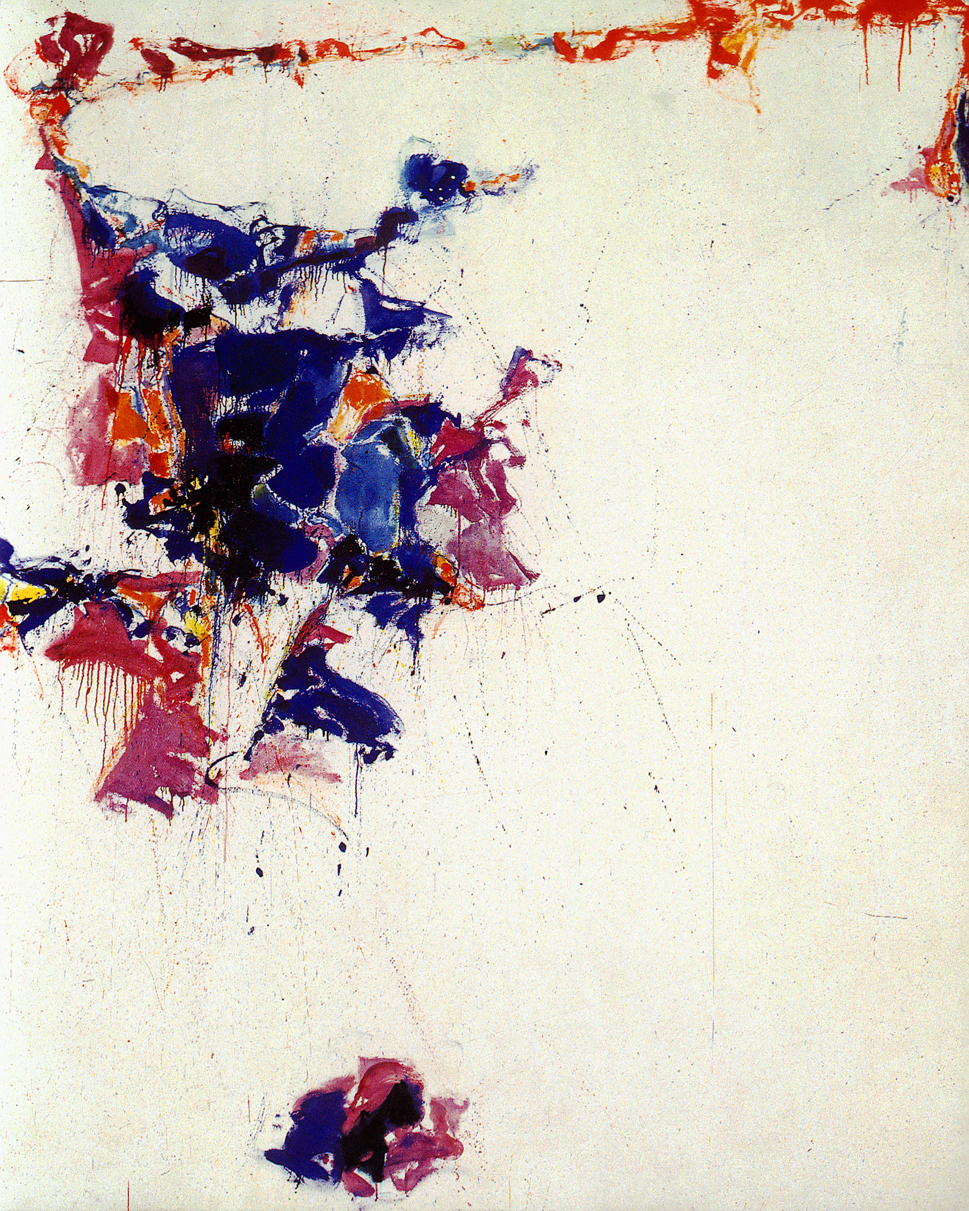
Melville among the Philosophers
Melville among the Philosophers
Edited by Corey McCall and Tom Nurmi
Afterword by Cornel West
LEXINGTON BOOKS
Lanham Boulder New York London
Published by Lexington Books
An imprint of The Rowman & Littlefield Publishing Group, Inc.
4501 Forbes Boulevard, Suite 200, Lanham, Maryland 20706
www.rowman.com
Unit A, Whitacre Mews, 26-34 Stannary Street, London SE11 4AB
Copyright 2017 by Lexington Books
All rights reserved. No part of this book may be reproduced in any form or by any electronic or mechanical means, including information storage and retrieval systems, without written permission from the publisher, except by a reviewer who may quote passages in a review.
British Library Cataloguing in Publication Information Available
Library of Congress Cataloging-in-Publication Data
Names: McCall, Corey, editor. | Nurmi, Tom, editor.
Title: Melville among the philosophers / edited by Corey McCall and Tom Nurmi.
Description: Lanham : Lexington Books, 2017. | Includes bibliographical references and index.
Identifiers: LCCN 2017033886 (print) | LCCN 2017040464 (ebook) | ISBN 9781498536752 (Electronic) | ISBN 9781498536745 (cloth : alk. paper)
Subjects: LCSH: Melville, Herman, 1819-1891--Philosophy. | Melville, Herman, 1819-1891--Criticism and interpretation.
Classification: LCC PS2387 (ebook) | LCC PS2387 .M375 2017 (print) | DDC 813/.3--dc23
LC record available at https://lccn.loc.gov/2017033886
 TM The paper used in this publication meets the minimum requirements of American National Standard for Information Sciences Permanence of Paper for Printed Library Materials, ANSI/NISO Z39.48-1992.
TM The paper used in this publication meets the minimum requirements of American National Standard for Information Sciences Permanence of Paper for Printed Library Materials, ANSI/NISO Z39.48-1992.
Printed in the United States of America
Corey McCall & Tom Nurmi
Melvilles Silence
In 1851, the wicked year of Moby-Dick, Herman Melville wrote to Nathaniel Hawthorne about the transient nature of their craft: The very fingers that now guide this pen are not precisely the same that just took it up and put it on this paper. Lord, when shall we be done changing? Such sober Wordsworthian (and Melvillean) themestime, grief, memory, faith, and deathsilence the joyous songbirds in earlier lines and draw the Ode to its final stanza. But Wordsworth leaves unresolved the implied question. What, exactly, is a philosophic mind in a world of constant change?
This lingering question framed Melvilles writing in various ways for the rest of his career, giving shape to some of his most famous passages and the philosophical problems that underlie them. Is the philosophic mind necessarily a literary mind? Does writing, in its very belatedness, somehow capture the ties between thought and expression? How does literature operate between the saying and the said, the sound and the silence? And what are the frequencies or interferenceswhat Cesare Casarino calls philopoesisthat persist between literature and philosophy? These questions, perhaps even more resonant in our current century, offer us a starting point for Melville among the Philosophers: a collection of essays that, together, consider the transformative relations between history, literature, and philosophy in the fiction and poetry of Herman Melville.
For more than a century and a half, readers have found Melvilles writing rich with philosophical ideas, and we know that Melville read widely in philosophy throughout his life. A dedicated reader of Plato, Aristotle, Schiller, and Schopenhauer, among other philosophers, Melville meditated on the heritage of Western philosophy until his final days.
In the twenty-first century, literary scholars continue to trace and extend Melvilles philosophical sources and allusions, integrating philosophical concepts into new interpretive frameworks for his life and work, while philosophers from Albert Camus to Gilles Deleuze and Giorgio Agamben have woven Melvilles texts into their own projects. But what, precisely, is philosophically significant about Melvilles fiction and poetry? And why are philosophers so attracted to Melville in particular? Melville among the Philosophers addresses these questions by thinking through the metamorphic ethos of Melvilles 1851 letter to Hawthorne and its joint implications for literary theory and philosophy. The essays in this collection examine various philosophical contexts for Melvilles work and take seriously Melvilles writings as philosophy. Together, the essays consider the meaning of literature for contemporary philosophy and the many ways that Melville disturbs and reassembles our conceptions of self and world. Melville among the Philosophers is ultimately an intervention across two disciplinesliterary studies and philosophythat charts new paths into the work of one of Americas most celebrated authors, a man who continues to enchant and challenge readers nearly two centuries after his birth.
It was not until late in his life, and only fully after his death, that critics began to discern more clearly the philosophical depths of Melvilles writing. Early scholarship emphasized the Melvilles philosophical tone and influences, but the publications of F.O. Matthiessens American Renaissance (1941) and Lawrence Thompsons Melvilles Quarrel with God (1952) were watershed moments in Melville studies, signaling an interpretive shift in which literary critics began to wrestle in earnest with the philosophical problems of democracy and theology embedded into Melvilles long fiction. More recently, a number of edited volumes suggest renewed interest in how the aesthetic and formal features of Melvilles oeuvre come to bear on its philosophical depth: for example, Samuel Otter and Geoffrey Sanborns Melville and Aesthetics (2011) and Branka Arsi and K. L. Evanss Melvilles Philosophies (2017), as well as the forthcoming volumes from Meredith Farmer and Jonathan Schroeder and Cody Marrs.
But there has been relatively little attention paid, in the context of Melville particularly, to the lack of direct conversation between literature and philosophy and how that silence alters the reception of Melville in both disciplines. We might account for the rift between literary scholars and philosophers by noting how the divide between Anglo-American and Continental philosophy shaped the discipline during the twentieth century. Anglo-American analytic philosophy cast a shadow of skepticism over the value of literature for philosophical inquiry. Literature, so the argument went, might provide apt examples to make a philosophical point but was ultimately a field wholly separate from the work of philosophy proper. Though this dismissive attitude toward literature has begun to change in recent years through the work of figures such as Martha Nussbaum, Richard Rorty, and Stanley Cavell, few Anglo-American philosophers have focused specifically and at-length on Melville.
Nevertheless, Melville has been used by philosophers in at least two ways: as an author of specific texts that, in part or whole, exemplify or challenge a given philosophical claim, or as an author whose practice of writing speaks in some way to the nature of the philosophical enterprise itself. The encounter between philosophy and Melville constitutes, on the one hand, a crucial basis for understanding Melvilles literary career and, on the other, an unspoken series of questions about philosophy and (or
Font size:
Interval:
Bookmark:
Similar books «Melville among the Philosophers»
Look at similar books to Melville among the Philosophers. We have selected literature similar in name and meaning in the hope of providing readers with more options to find new, interesting, not yet read works.
Discussion, reviews of the book Melville among the Philosophers and just readers' own opinions. Leave your comments, write what you think about the work, its meaning or the main characters. Specify what exactly you liked and what you didn't like, and why you think so.

